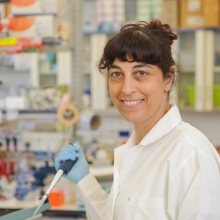Dr. Ruth Scherz-Shouval
Investigating cancer’s partners in crime: the microenvironment
New scientists

All criminals have their sidekicks who help them carry out their bad deeds. Cancer cells grow and replicate in much the same way—with the assistance of their surrounding environment.
This so-called “tumor microenvironment” is receiving increasing attention from the global community of research scientists. One of the new, young leaders in this field is Dr. Ruth Scherz-Shouval, who joined the Weizmann Institute in 2015 after a postdoctoral fellowship at the Massachusetts Institute of Technology (MIT).
The question she is pursuing is how cancer cells recruit and subvert normal cells to create an environment that promotes tumor progression and metastasis. What is known, so far, is that cancer cells activate normal, surrounding cells to form blood vessels and connective tissue that fight the immune system. She wants to know, specifically, which mechanisms are at work throughout this process.
Dr. Scherz-Shouval did her PhD at the Weizmann Institute under the guidance of Prof. Zvulun Elazar, an expert in the process of autophagy - the ability of the body’s cells to discard or recycle defective or toxic materials. She made a major contribution to the field by unraveling a novel mechanism of regulation of autophagy, mediated by reactive oxygen species such as hydrogen peroxide. Then she did a first postdoctoral fellowship with Prof. Moshe Oren, an expert in cancer research who directs the Moross Integrated Cancer Center.
For her second postdoc, at the Whitehead Institute for Biomedical Research at MIT, she received a grant from the Israel National Program for Advancing Women in Science that is led by the Weizmann Institute. The grant, given to 10 outstanding women scientists per year to conduct postdoctoral studies abroad, is given in addition to postdoc salaries and is meant to help women and their families manage with the financial pressures typical of a postdoctoral period. In addition, she received a Human Frontier Science Program Fellowship and a Fulbright award.
With the understanding that tumors are complex organs that are highly dependent on normal cells in their environment, at MIT she set out to study the tumor microenvironment. She zeroed in on the heat shock response that cells activate when subject to thermal stress such as fever following inflammation, and identified a new role for the “master regulator” of this response, heat-shock factor 1 (HSF1), in the tumor microenvironment. She showed how HSF1 helps reprogram fibroblasts, the cells responsible for making the extracellular matrix and collagen in a tumor’s nearby tissues, causing them to support the tumor’s malignancy.
In collaboration with clinicians at the Brigham and Women’s Hospital and Beth Israel Hospital in Boston, and Rabin Medical Center in Israel, clinical studies confirmed that in early-stage breast and lung cancer, high stromal HSF1 activation is strongly associated with poor patient outcome, a finding that has significant diagnostic and therapeutic implications. Her research may also have implications for inflammation more generally, in particular inflammatory bowel disease (IBD).
Dr. Ruth Scherz-Shouval is funded by The Estate of Annice Anzelewitz, Comisaroff Family Trust, Elsie and Marvin Dekelboum Family Foundation, Peter and Patricia Gruber Awards, Joseph Gurwin Foundation, The Laura Gurwin Flug Family Fund, Rising Tide Foundation, Estate of Mordecai M. Roshwald, Dr. Zwi & Amelia Steiger Cancer Research Fund. Dr. Scherz-Shouval is the incumbent of the Ernst and Kaethe Ascher Career Development Chair in Life Sciences.








